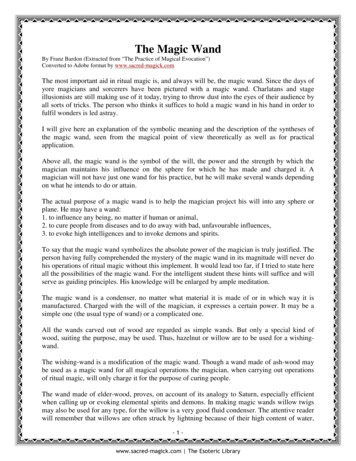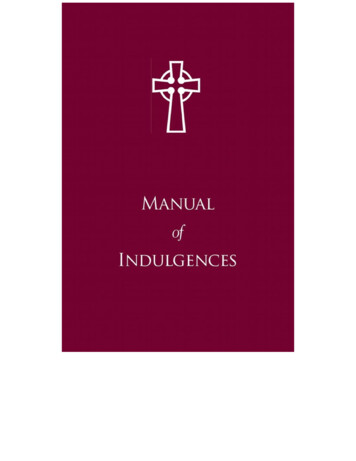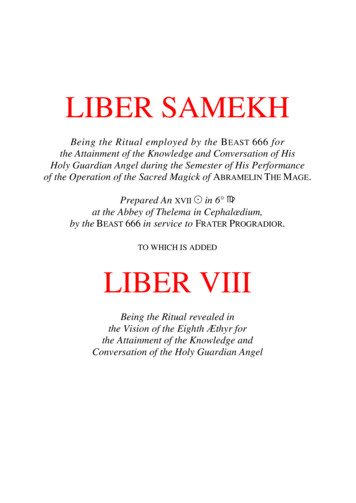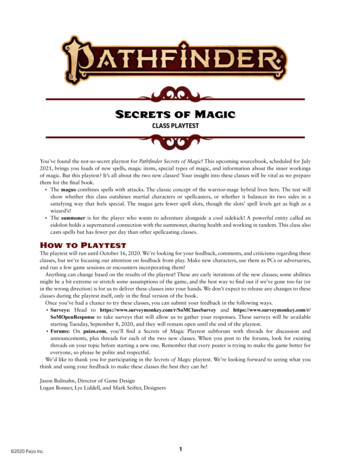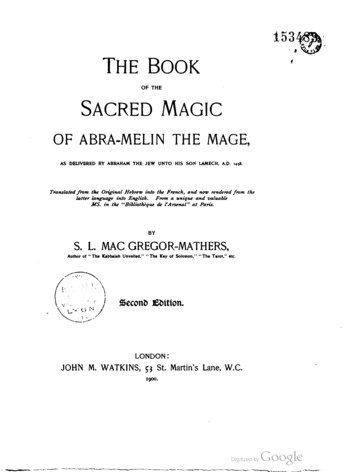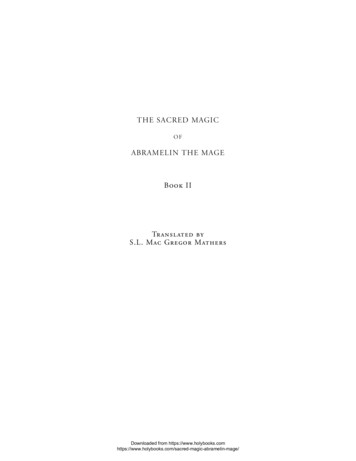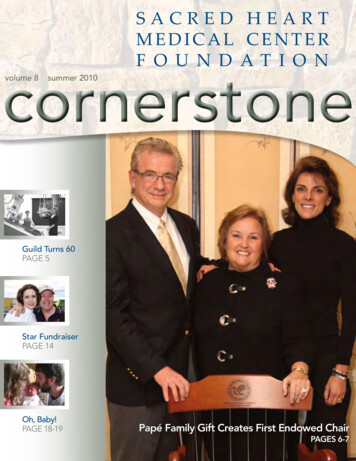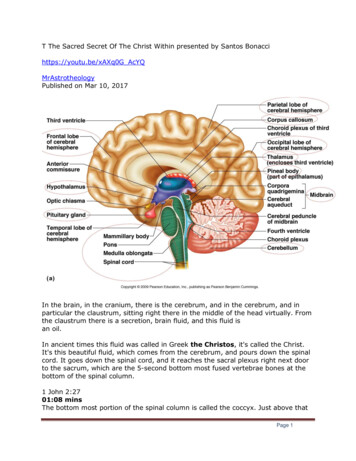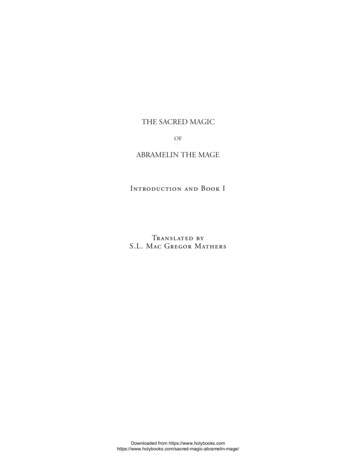
Transcription
The Sacred MagicofAbramelin the MageIntroduction and Book ITranslated byS.L. Mac Gregor MathersDownloaded from /sacred-magic-abramelin-mage/
The Sacred Magic of Abramelin the MageIntroduction and Book IThis Adobe Acrobat edition contains the complete and unaltered text of thecorresponding sections in the second (1900) edition published by John M. Watkins,London.Prepared and typeset by Benjamin Rowe, December 6, 1998.Downloaded from /sacred-magic-abramelin-mage/
INTRODUCTION,BYS.L. MAC GREGOR MATHERS.2WING perhaps to the circumstance that the indispensable “Baedecker”accords only a three or four line notice to the “Bibliothèque de l'Arsenal” –but few English or American visitors to Paris are acquainted with its name,situation, or contents, though nearly all know at least by sight the “BibliothèqueNationale” and the “Bibliothèque Mazarin”.This “Library of the Arsenal,” as it is now called, was founded as a privatecollection by Antoine René Voyer D'Argenson, Marquis de Paulny; and was firstopened to the public on the th Floréal, in the fifth year of the French Republic(that is to say, on th April, ), or just a century ago. This Marquis de Paulnywas born in the year , died in , and was successively Minister of War, andAmbassador to Switzerland, to Poland, and to the Venetian Republic. His lateryears were devoted to the formation of this Library, said to be one of the richestprivate collections known. It was acquired in by the Comte D'Artois, andtoday belongs to the State. It is situated on the right bank of the Seine, in the Ruede Sully, near the river, and not far from the Place de la Bastille, and is known asthe “Bibliothèque de l'Arsenal”. In round numbers it now possesses , printedbooks, and about manuscripts, many of them being of considerable value.Among the latter is this Book of the Sacred Magic of Abra-Melin, as deliveredby Abraham the Jew unto his son Lamech; which I now give to the public inprinted form for the first time.Many years ago I heard of the existence of this manuscript from a celebratedoccultist, since dead; and more recently my attention was again called to it by mypersonal friend, the well-known French author, lecturer and poet, Jules Bois, whoseattention has been for some time turned to occult subjects. My first-mentionedinformant told me that it was known both to Bulwer Lytton and Eliphas Levi, thatthe former had based part of his description of the Sage Rosicrucian Mejnour onthat of Abra-Melin, while the account of the so-called Observatory of Sir PhilipDerval in the “Strange Story” was to an extent copied from and suggested by that ofthe Magical Oratory and Terrace, given in the Eleventh Chapter of the SecondBook of this present work. Certainly also the manner of instruction applied byMejnour in “Zanoni” to the Neophyte Glyndon, together with the test of leavinghim alone in his abode to go on a short journey and then returning unexpectedly, isclosely similar to that employed by Abra-Melin to Abraham, with this difference,iDownloaded from /sacred-magic-abramelin-mage/
Introductionthat the latter successfully passed through that test, while Glyndon failed. It wouldalso be especially such experiments as those described at length in the Third Book,which the author of the “Strange Story” had in view when he makes Sir PhilipDerval in the MS. history of his life speak of certain books describing occultexperiments, some of which he had tried and to his surprise found succeed.This rare and unique manuscript of the Sacred Magic of Abra-Melin, fromwhich the present work is translated, is a French translation from the originalHebrew of Abraham the Jew. It is in the style of script usual at about the end of theseventeenth and beginning of the eighteenth centuries, and is apparently by the1same hand as another MS. of the Magic Of Picatrix also in the “Bibliothèque deL'Arsenal”. I know of no other existing copy or replica of this Sacred Magic ofAbra-Melin, not even in the British Museum, whose enormous collection of OccultManuscripts I have very thoroughly studied. Neither have I ever heard by2traditional report of the existence of any other copy. In giving it now to the Public,I feel, therefore, that I am conferring a real benefit upon English and especiallyAmerican students of Occultism, by placing within their reach for the first time aMagical work of such importance from the Occult standpoint.The Manuscript is divided into three Books, each with its separate Title Page,surrounded by an ornamental border of simple design, in red and black ink, andwhich is evidently not intended to be symbolical in the slightest degree, but issimply the work of a conscientious caligraphist wishing to give an appearance ofcleanness and completeness to the Title Page.The wording of each is the same: “Livre Premier (Second or Troisième, asthe case may be) de la Sacrée Magie que Dieu donna à Moyse, Aaron, David,Salomon et à d’autres Saints Patriarches et Prophetes qui enseigne la vrayesapience Divine laissée par Abraham à Lamech son Fils traduite de l’hebreu ”. I give the translated title at the commencement of each of the Three Books.On the fly-leaf of the original MS. is the following note in the handwriting ofthe end of the eighteenth century: —“This Volume contains Books, of which here is the first. – The Abraham andthe Lamech, of whom there is here made question, were Jews of the fifteenthcentury, and it is well known that the Jews of that period possessing the Cabala ofSolomon passed for being the best Sorcerers and Astrologers.” Then follows inanother and recent hand:–1Probably the same as Gio Peccatrix the Magician, the author of many Manuscripts on Magic.Since writing the above, I have heard casually that a copy of at least part, or perhaps of the whole, issaid to exist in Holland.2iiDownloaded from /sacred-magic-abramelin-mage/
Introduction“Volume composed of three parts– st part pages. nd rd —— June, .”The style of the French employed in the text of the MS. is somewhat vague andobscure, two qualities unhappily heightened by the almost entire absence of anyattempt at punctuation, and the comparative rarity of paragraphic arrangement.Even the full stop at the close of a sentence is usually omitted, neither is thecommencement of a fresh one marked by a capital letter. The following example istaken from near the end of the Third Book; “Cest pourquoy la premiere choseque tu dois faire principalement ates esprits familiers sera de leur commanderde ne tedire jamais aucune chose deuxmemes que lorsque tu les interrogerasamoins queles fut pour tavertir des choses qui concerne ton utilite outonprejudice parceque situ ne leur limite pas leparler ils tediront tant etdesigrandes choses quils tofusquiront lentendement et tu ne scaurois aquoytentenir desorte que dans la confusion des choses ils pourroient te faireprevariquer ettefaire tomber dans des erreurs irreparables ne te fais jamais prieren aucune chose ou tu pourras aider et seccourir tonprochain et nattends pasquil tele demande mais tache descavoir afond,” etc. This extract may be said togive a fair idea of the average quality of the French. The style, however, of the FirstBook is much more colloquial than that of the Second and Third, it beingespecially addressed by Abraham to Lamech, his son, and the second person singularbeing employed throughout it. As some English readers may be ignorant of the fact,it is perhaps as well here to remark that in French “tu,” thou, is only used betweenvery intimate friends and relations, between husband and wife lovers, etc.; while“vous,” you, is the more usual mode of address to the world in general. Again, insacred books, in prayers, etc., “vous” is used, where we employ "thou" as having amore solemn sound than “tu”. Hence the French verb “tutoyer,” “to be veryfamiliar with, to be on extremely friendly terms with any one, and even to beinsolently familiar”. This First Book contains advice concerning Magic, and adescription of Abraham’s Travels and experiences, as well as a mention of the manymarvellous works he had been able to accomplish by means of this system of SacredMagic. The Second and Third Books (which really contain the Magic ofAbra-Melin, and are practically based on the two MSS. entrusted by him toAbraham, the Jew, but with additional comments by the latter) differ in style fromiiiDownloaded from /sacred-magic-abramelin-mage/
Introductionthe former, the phraseology is quaint and at times vague, and the second personplural, “vous,” is employed for the most part instead of “tu”.The work may then be thus roughly classified:First Book: Advice and Autobiography; both addressed by the Authorto his son Lamech.Second Book: General and complete description of the means ofobtaining the Magical Powers desired.Third Book: The application of these Powers to produce an immensenumber of Magical results.Though the chapters of the Second and Third Books have special headings inthe actual text, those of the First Book have none; wherefore in the “Table ofContents” I have supplemented this defect by a careful analysis of their subjectmatter.This system of Sacred Magic Abraham acknowledges to have received from theMage Abra-Melin; and claims to have himself personally and actually wroughtmost of the wonderful effects described in the Third Book, and many others besides.Who then was this Abraham the Jew? It is possible, though there is no mentionof this in the MS., that he was a descendant of that Abraham the Jew who wrotethe celebrated Alchemical work on twenty-one pages of bark or papyrus, whichcame into the hands of Nicholas Flamel, and by whose study the latter is saideventually to have attained the possession of the “Stone of the Wise”. The onlyremains of the Church of Saint Jacques de la Boucherie which exists at the presentday, is the tower, which stands near the Place du Châtelet, about ten minutes’ walkfrom the Bibliothèque de l'Arsenal; and there is yet a street near this tower whichbears the title of “Rue Nicolas Flamel,” so that his memory still survives in Paris,together with that of the Church close to which he lived, and to which, after theattainment of the Philosopher’s Stone, he and his wife Pernelle caused a handsomeperistyle to be erected.From his own account, the author of the present work appears to have beenborn in A.D. , and to have written this manuscript for his son, Lamech, in , being then in his ninety-sixth year. That is to say, that he was thecontemporary both of Nicholas Flamel and Pernelle, and also of the mysticalChristian Rosenkreutz, the founder of the celebrated Rosicrucian Order orFraternity in Europe. Like the latter, he appears to have been very early seized withthe desire of obtaining Magical Knowledge; like him and Flamel, he left his homeand travelled in search of the Initiated Wisdom; like them both, he returned tobecome a worker of wonders. At this period, it was almost universally believed thativDownloaded from /sacred-magic-abramelin-mage/
Introductionthe Secret Knowledge was only really obtainable by those who were willing to quittheir home and their country to undergo dangers and hardships in its quest; andthis idea even obtains to an extent in the present day. The life of the late MadameBlavatsky is an example in point.This period in which Abraham the Jew lived was one in which Magic wasalmost universally believed in, and in which its Professors were held in honour;Faust (who was probably also a contemporary of our author), Cornelius Agrippa,Sir Michael Scott, and many others I could name, are examples of this, not tomention the celebrated Dr. Dee in a later age. The history of this latter Sage, hisassociation with Sir Edward Kelly, and the part he took in the European politics ofhis time are too well known to need description here.That Abraham the Jew was not one whit behind any of these Magicians inpolitical influence, is evident to any one who peruses this work. He stands a dimand shadowy figure behind the tremendous complication of central Europeanupheaval at that terrible and instructive epoch; as Adepts of his type always appearand always have appeared upon the theatre of history in great crises of nations. Theage which could boast simultaneously three rival claimants to the direction of twoof the greatest levers of the society of that era – the Papacy and the GermanicEmpire – when the jealousies of rival Bishoprics, the overthrow of Dynasties, theRoman Church shaken to her foundations, sounded in Europe the tocsin of thatfearful struggle which invariably precedes social reorganisation, that wildwhirlwind of national convulsion which engulfs in its vortex the civilisation of ayesterday, but to prepare the reconstitution of a morrow. The enormous historicalimportance of such men as our Author is always underrated, generally doubted;notwithstanding that like the writing on the wall at Belshazzar’s feast, theirmanifestation in the political and historical arena is like the warning of a Mene,Mene Tekel, Upharsin, to a foolish and undiscerning world.The full and true history of any Adept could only be written by himself, andeven then, if brought before the eyes of the world at large, how many persons wouldlend credence to it? and even the short and incomplete statement of the notableevents of our Author’s life contained in the First Book, will be to most readersutterly incredible of belief. But what must strike all alike is the tremendous faith ofthe man himself, as witnessed by his many and dangerous journeyings for so manyyears through wild and savage regions and places difficult of access even in our ownday with all the increased facilities of transit which we enjoy. This faith at lengthbrought him its reward; though only at the moment when even he was becomingdiscouraged and sick at heart with disappointed hope. Like his great namesake, theforefather of the Hebrew race, he had not in vain left his home, his “Ur of theChaldees,” that he might at length discover that Light of Initiated Wisdom, forwhich his soul had cried aloud within him for so many years. This culmination ofvDownloaded from /sacred-magic-abramelin-mage/
Introductionhis wanderings was his meeting with Abra-Melin, the Egyptian Mage. From himhe received that system of Magical instruction and practice which forms the body ofthe Second and Third Books of this work.In the Manuscript original this name is spelt in several different ways, I havenoted this in the text wherever it occurs. The variations are: Abra-Melin,Abramelin, Abramelim, and Abraha-Melin. From these I have selected theorthography Abra-Melin to place on the title page, and I have adhered to the samein this Introduction.As far as can be gathered from the text, the chief place of residence of Abrahamthe Jew after his travels was Würzburg, or, as it was called in the Middle Ages,“Herbipolis”. He appears to have married his cousin, and by her to have had twosons, the elder, named Joseph, whom he instructed in the Mysteries of the HolyQabalah, and Lamech, the younger, to whom he bequeaths this system of SacredMagic as a legacy, and to whom the whole of the First Book is addressed. He speaksfurther of three daughters, to each of whom he gave , golden florins as adowry. He expressly states that he obtained both his wife, and a treasure of , , golden florins, by means of some of the Magical Operations described inthe Third Book. He further admits that his first inclination to Qabalistical andMagical studies was owing to certain instructions in the Secrets of the Qabalah,which he received when young from his father, Simon; so that after the death of thelatter his most earnest desire was to travel in search of an Initiated Master.To the sincere and earnest student of Occultism this work cannot fail to be ofvalue, whether as an encouragement to that most rare and necessary quality,unshaken faith; as an aid to his discrimination between true and false systems ofMagic; or as presenting an assemblage of directions for the Production of Magicaleffects, which the Author of the book affirms to have tried with success.Especially valuable are the remarks of Abraham the Jew on the variousProfessors of the “Art which none may name” in the course of his wanderings andtravels; the account of the many wonders he worked; and, above all, the carefulclassification of the Magical Experiments in the Third Book, together with hisobservations and advice thereon.Not least in interest are the many notable Persons of that age for or againstwhom he performed marvels: The Emperor Sigismund of Germany: Count Fredericthe Quarreller: the Bishop of his city (probably either John I., who began thefoundation of the Würzburg University in with the authorisation of PopeBoniface IX., or else Echter von Mespelbrunn, who completed the same noblework): the Count of Warwick: Henry VI. of England: the rival Popes – JohnXXIII., Martin V., Gregory XII., and Benedict XIII.: the Council of Constance: theDuke of Bavaria: Duke Leopold of Saxony: the Greek Emperor, ConstantineviDownloaded from /sacred-magic-abramelin-mage/
IntroductionPalaeologos: and probably the Archbishop Albert of Magdeburg: and also some ofthe Hussite Leaders – a roll of names celebrated in the history of that stirring time.Considering the era in which our Author lived, and the nation to which hebelonged, he appears to have been somewhat broad in his religious views; for notonly does he insist that this Sacred system of Magic may be attained by any one,whether Jew, Christian, Mahometan, or Pagan, but he also continually warnsLamech against the error of changing the religion in which one has been broughtup; and he alleges this circumstance as the reason of the occasional failures of theMagician Joseph of Paris (the only other person he mentions besides himself andAbra-Melin who was acquainted with this particular system of Magic), namelythat having been brought up a Christian, he had renounced that faith and becomea Jew. At first sight it does not seem clear from the Occult point of view whatparticular Occult disadvantage should be attached to such a line of action. But wemust remember, that in his age, the conversion to another religion invariablymeant an absolute, solemn and thorough renunciation and denial of any truth inthe religion previously professed by the convert. Herein would be the danger,because whatever the errors, corruption, or mistakes in any particular form ofreligion, all are based on and descended from the acknowledgment of SupremeDivine Powers. Therefore to deny any religion (instead of only abjuring themistaken or erroneous parts thereof ) would be equivalent to denying formally andceremonially the truths on which it was originally founded; so that whenever aperson having once done this should begin to practise the Operations of the SacredMagic, he would find himself compelled to affirm with his whole will-force thosevery formulas which he had at one time magically and ceremonially (thoughignorantly) denied; and whenever he attempted to do this, the occult Law ofReaction would raise as a Ceremonial Obstacle against the effect which he shouldwish to produce, the memory of that Ceremonial Denial which his previousrenunciation had firmly sealed in his atmosphere. And the force of this would be inexact proportion to the manner and degree in which he had renounced his formercreed. For of all hindrances to Magical action, the very greatest and most fatal isunbelief, for it checks and stops the action of the Will. Even in the commonestnatural operations we see this. No child could learn to walk, no student couldassimilate the formulas of any science, were the impracticability and impossibilityof so doing the first thing in his mind. Wherefore it is that all Adepts and GreatTeachers of Religion and of Magic have invariably insisted on the necessity of faith.But though apparently more broad in view in admitting the excellence ofevery religion, unfortunately he shows the usual injustice to and jealousy of womenwhich has distinguished men for so many ages, and which as far as I can see arisespurely and simply from an innate consciousness that were women once admitted tocompete with them on any plane without being handicapped as they have been forviiDownloaded from /sacred-magic-abramelin-mage/
Introductionso many centuries, the former would speedily prove their superiority, as theAmazons of old did; which latter (as the writings even of their especial enemies, theGreeks, unwillingly admit) when overcome, were conquered by superior numbers,not by superior valour. However, Abraham the Jew grudgingly admits that theSacred Magic may be attained by a virgin, while at the same time dissuading anyone from teaching it to her! The numerous advanced female occult students of thepresent day are the best answer to this.But notwithstanding the forementioned shortcomings, his advice on themanner of using Magical Power, when acquired, to the honour of God, the welfareand relief of our neighbour, and for the benefit of the whole Animate Creation, isworthy of the highest respect; and no one can peruse it without feeling that hishighest wish was to act up to his belief.His counsel, however, of a retired life after attaining Magical Power by hissystem (I do not speak of the retirement during the six months’ preparation for thesame) is not borne out by his own account of his life, wherein we find him soconstantly involved in the contests and convulsions of the time. Also, however muchthe life of a hermit or anchorite may appear to be advocated, we rarely, if ever, findit followed by those Adepts whom I may perhaps call the initiated andwonderworking medium between the Great Concealed Adepts and the OuterWorld. An example of the former class we may flnd in our Author, an example ofthe latter in Abra-Melin.The particular scheme or system of Magic advocated in the present work is toan extent “sui generis,” but to an extent only. It is rather the manner of itsapplication which makes it unique. In Magic, that is to say, the Science of theControl of the Secret Forces of Nature, there have always been two great schools, theone great in Good, the other in Evil; the former the Magic of Light, the latter thatof Darkness; the former usually depending on the knowledge and invocation of theAngelic natures, the latter on the method of evocation of the Demonic races.Usually the former is termed White Magic, as opposed to the latter, or BlackMagic.The invocation of Angelic Forces, then, is an idea common in works of Magic,as also are the Ceremonies of Pact with and submission to the Evil Spirits. Thesystem, however, taught in the present work is based on the following conception:(α) That the Good Spirits and Angelic Powers of Light are superior in power to theFallen Spirits of Darkness. (β) That these latter as a punishment have beencondemned to the service of the Initiates of the Magic of Light. (This Idea is to befound also in the Koran or, as it is frequently and perhaps more correctly written,“Qur-an”.) (γ) As a consequence of this doctrine, all ordinary material effects andphenomena are produced by the labour of the Evil Spirits under the commandviiiDownloaded from /sacred-magic-abramelin-mage/
Introductionusually of the Good. (δ) That consequently whenever the Evil Demons can escapefrom the control of the Good, there is no evil that they will not work by way ofvengeance. (ε) That therefore sooner than obey man, they will try to make himtheir servant, by inducing him to conclude Pacts and Agreements with them. (ζ)That to further this project, they will use every means that offers to obsess him. (η)That in order to become an Adept, therefore, and dominate them; the greatestpossible firmness of will, parity of soul and intent, and power of self-control isnecessary. (θ) That this is only to be attained by self-abnegation on every plane. (ι)That man, therefore, is the middle nature, and natural controller of the middlenature between the Angels and the Demons, and that therefore to each man isattached naturally both a Guardian Angel and a Malevolent Demon, and alsocertain Spirits that may become Familiars, so that with him it rests to give thevictory unto the which he will. (κ) That, therefore, in order to control and makeservice of the Lower and Evil, the knowledge of the Higher and Good is requisite(ie., in the language of the Theosophy of the present day, the knowledge of theHigher Self ).From this it results that the magnum opus propounded in this work is: bypurity and self-denial to obtain the knowledge Of and conversation with one’sGuardian Angel, so that thereby and thereafter we may obtain the right of usingthe Evil Spirits for our servants in all material matters.This, then, is the system of the Secret Magic of Abra-Melin, the Mage, astaught by his disciple Abraham the Jew; and elaborated down to the smallestpoints.Except in the professed Black Magic Grimoires, the necessity of the invocationof the Divine and Angelic Forces to control the Demons is invariably insisted uponin the operations of evocation described and taught in mediaeval MagicalManuscripts and published works. So that it is not so much, as I have before said,this circumstance, as the mode of its development by the Six Moons’ preparation,which is unusual; while again, the thorough and complete classification of theDemons with their offices, and of the effects to be produced by their services, is notto be found elsewhere.Apart from the interest attaching to the description of his travels, the carefulmanner in which Abraham has made note of the various persons he had metprofessing to be in the possession of Magical powers, what they really could do andcould not do, and the reasons of the success or failure of their experiments, has aparticular value of its own.The idea of the employment of a Child as Clairvoyant in the invocation of theGuardian Angel is not unusual; for example, in the “Mendal,” a style of OrientalDivination familiar to all readers of Wilkie Collins’ novel, “The Moonstone,” inkixDownloaded from /sacred-magic-abramelin-mage/
Introductionis poured into the palm of a Childs hand, who, after certain mystical words beingrecited by the Operator, beholds visions clairvoyantly therein. The celebratedevocation at which the great Mediaeval Sculptor, Benvenuto Cellini, is said to have3assisted, also was in part worked by the aid of a Child as Seer. Cagliostro also issaid to have availed himself of the services of Children in this particular. But formy part I cannot understand the imperative necessity of the employment of a Childin the Angelic evocation, if the Operator be pure in mind, and has developed theclairvoyant faculty which is latent in every human being, and which is based onthe utilisation of the thoughtvision. This thought-vision is exercised almostunconsciously by everyone in thinking of either a place, person, or thing, which theyknow well; immediately, coincident with the thought, the image springs before themental sight; and it is hut the conscious and voluntary development of this which isthe basis of what is commonly called clairvoyance. Among the Highlanders ofScotland, the faculty, as is well known, is of common manifestation; and theEnglish it is usually spoken of as “by Second-Sight”.Unfortunately, like far too many modern Occultists, Abraham the Jew shows amarked intolerance of Magical systems differing from his own; even the renowned4name of Petrus di Abano is not sufficient to save the “Heptameron or MagicalElements” from condemnation in the concluding part of the Third Book. Works onMagic, Written Conjurations, Pentacles, Seals, and Symbols, the employment ofMagical Circles, the use of any language but one's mother tongue, appear at firstsight to be damned wholesale, though on a more careful examination of the text Ithink we shall find that it is rather their abuse through ignorance of their meaningwhich he intends to decry, than their intelligent and properly regulated use.It will be well here to carefully examine these points from the occult standpointof an Initiate, and for the benefit of real students.Abraham in several places insists that the basis of this system of Sacred Magicis to be found in the Qabalah. Now, he expressly states that he has instructed hiseldest son, Joseph, herein as being his right by primogeniture, even as he himself hadreceived somewhat of Qabalistic instruction from his father, Simon. But this systemof Magic he bequeaths to his younger son, Lamech, expressly as a species ofrecompense to him for not being taught the Qabalah, his status as a younger sonbeing apparently a serious traditional disqualification. This being so, the reason isevident why he warns Lamech against the use of certain Seals, Pentacles,incomprehensible words, etc.; because most of these being based on the secrets of theQabalah, their use by a person ignorant hereof might be excessively dangerousthrough the not only possible but Probable Perversion of the Secret Formulas34See Appendix B.Born about 1250.xDownloaded from /sacred-magic-abramelin-mage/
Introductiontherein contained. Any advanced student of Occultism who is conversant withMediaeval works on Magic, whether MS. or printed, knows the enormous andincredible number of errors in the Sigils, Pentacl
The Sacred Magic of Abramelin the Mage Introduction and Book I This Adobe Acrobat edition contains the complete and unaltered text of the corresponding sections i


